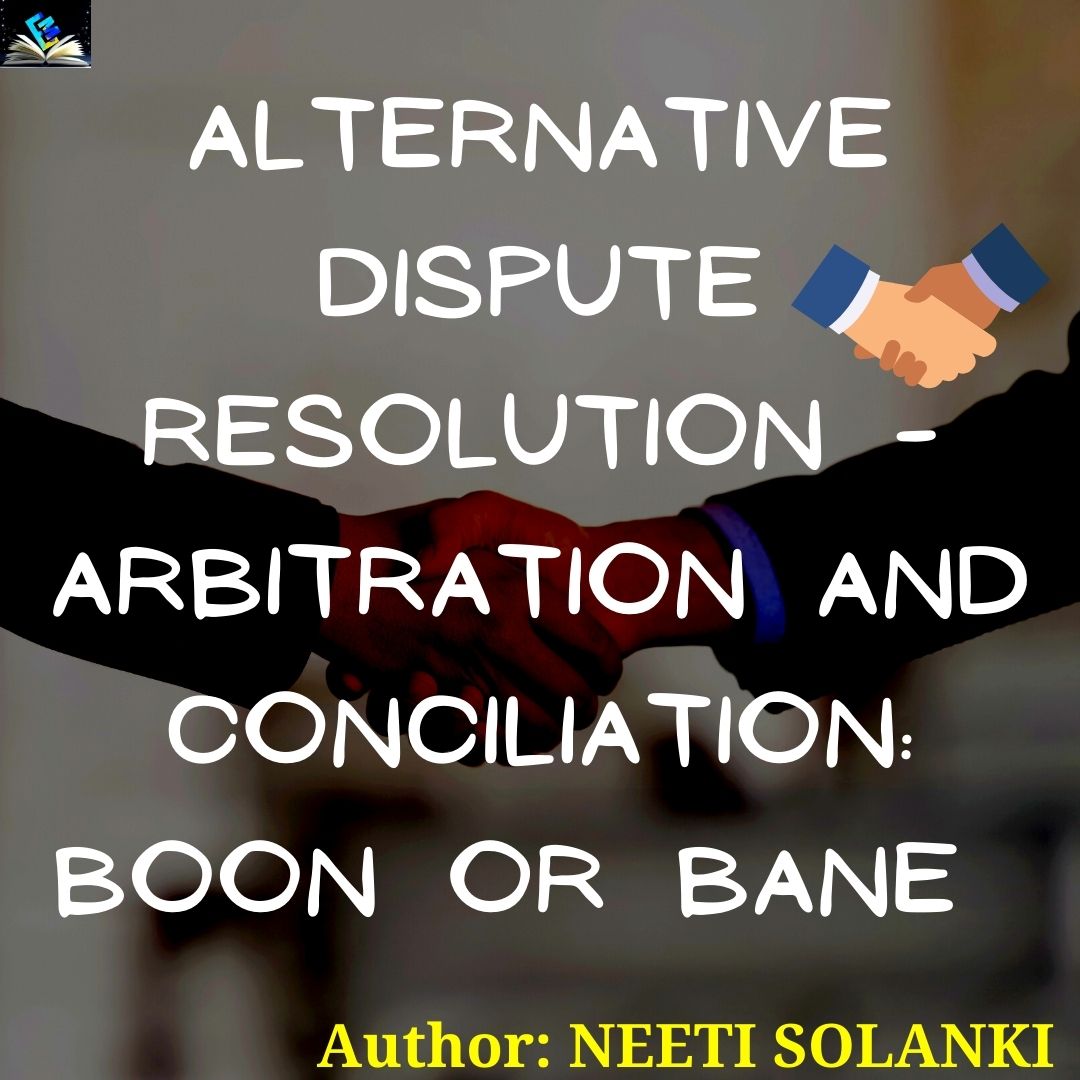
Alternative Dispute Resolution – Arbitration and Conciliation: Boon or Bane
Keywords: Arbitration, Conciliation, Alternative Dispute Resolution
Author: NEETI SOLANKI
Alternative dispute resolution is a type of dispute resolution which offers a facility to resolve a dispute between two disputing parties outside the court. There are four methods of alternative dispute resolution.
- Arbitration
- Conciliation
- Mediation
- Negotiation
We will discuss about the first two above mentioned types i.e. Arbitration and Conciliation.
ARBITRATION
It is one of the methods of alternative dispute resolution. In which a dispute is solved between two disputing parties with the intervention of a third party known as arbitrator, outside the court. The third party is appointed by the disputing party each, in odd numbers i.e. 3,5,7,etc. Each party appoints one arbitrator and the presiding arbitrator is appointed by the arbitrators that are already chosen by the disputing parties. The group of arbitrators is called the arbitration panel. When the dispute requires the presence of an expert in the relevant field, an expert should also be appointed as an arbitrator. Arbitrators have the right to require the production of relevant evidence and documents. This whole process is governed and regulated by The Arbitration and Conciliation Act, 1996.
Advantages of Arbitration
This method of alternative dispute resolution is proven to be beneficial for both the parties and the judiciary system. As compared to court proceedings, arbitration saves a lot of time and money of the parties as the fees of arbitrators is less than that of fees charged by lawyers, advocates. It also saves the time of parties as arbitration is a faster and more convenient method than judicial proceedings. The benefit to the judicial system is that, due to the arbitration, the burden of courts is lessened.
Arbitral Award
The decision given by the arbitration panel is called an arbitral award. Arbitral award is binding on the disputing parties if accepted by the parties or unless challenged. It can be challenged on the grounds of incapacity of parties to enter into arbitration agreement, incapacity of arbitrator, either of the parties did not receive the notice of arbitration or not given equal and reasonable opportunity to present the case. If the award is inconsistent with the case, the award is against public policy, and other more grounds as prescribed under the said Act.
The panel of arbitration shall contain all the arbitrators who are independent and are likely to remain independent in the future, during the arbitration process. This process can only be adopted with the mutual consent of both the parties. It is a confidential process where the facts, figures and documents submitted with the arbitrators are safe and confidentiality is maintained by both the parties and the arbitrators. Whenever arbitration is considered, it is always pre decided and the arbitration clause is mentioned in the agreement/contract. Arbitration is the most common and the easily accepted method of alternate dispute resolution worldwide. Each country has its own set of rules and regulations for arbitration. The commonality which can be seen worldwide is that, arbitration is the method which solves the dispute outside court and it is proved to be a more efficient and effective method from that of judicial proceedings worldwide.
CONCILIATION
Conciliation is the second type of alternate dispute resolution that we will discuss. It is a method of ADR where two parties decide to submit their dispute to a third neutral to help them to come to mutual agreement. It is somewhat similar to arbitration. The main difference is, in arbitration the third party is independent and in conciliation, the third party is neutral who is known as conciliator. Like arbitration, conciliation is also governed by the The Arbitration and Conciliation Act, 1996. It is a confidential, flexible and voluntary out of the court resolution process. The world’s biggest conciliation was done by Shrimati Kokilaben Ambani for his two sons.
Decision via Conciliation
It is a very effective and efficient process which saves the time and cost of both the parties. The Conciliation method saves the parties from the hustle of going to courts and long judicial proceedings. Unlike arbitral award, the decision of conciliation is not binding unless both the parties agree and sign the decision. Once the decision is signed, it is binding on both the parties. The signed copies of the decision are provided to both the parties. The parties to the dispute choose the time of conciliation, place of conciliation, and third neutral party which decides the dispute. Conciliator tries to resolve the dispute by communicating the tension, suggesting a solution, lowering the tension, minimizing the miscommunication and helping the disputing parties to reach a mutual solution. If the facts of the case need the advice of an expert, then an expert can also be consulted.
Conclusion
From the above discussion, we conclude that arbitration and conciliation is undoubtedly a boon as it is cost effective, it saves a lot of money for the parties. It is also proved to be a faster mode of dispute resolution as compared to judicial proceedings. Benefiting both the parties and the judiciary system of the country in many ways. It lessens the burden and number of cases in the court and also resolves them faster and efficiently. It is a very easy and flexible mode of dispute resolution. Parties which are not very financially sound can also opt for arbitration and conciliation. It helps them to save the heavy fees charged by the court, lawyers and the advocates. Allowing the parties to have more control over the process and results.
This process is less stressful as compared to the lengthy process of the courts. Both the parties play a great role in shaping the process of arbitration or conciliation and its outcome. One must always mention the clause of arbitration as a dispute resolution mechanism as it is proved to be more effective. Cases which can be solved through arbitration must be definitely solved through arbitration. By doing this, the courts in India can focus and give more attention to the cases which are matters of public security and of high importance. Advantages of arbitration and conciliation are more than the disadvantages.
Mail us at edumoundofficial@gmail.com






